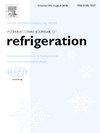Experimental performance of avocado seed oil as a bio-based phase change material for refrigeration applications
IF 3.5
2区 工程技术
Q1 ENGINEERING, MECHANICAL
International Journal of Refrigeration-revue Internationale Du Froid
Pub Date : 2024-10-09
DOI:10.1016/j.ijrefrig.2024.10.006
引用次数: 0
Abstract
Bio-based phase change materials (BPCMs) derived from agro-industrial residues represent an ecofriendly alternative for refrigeration applications. In this work, a BPCM was obtained by steam extraction from avocado seed and studied as a suitable cold thermal energy storage system. First, differential scanning calorimetry was used to determine that the solid-liquid phase transition occurred from -27°C to 15°C. This temperature range is of interest for the conservation different food products. The study aimed to determine the best distribution of the material, which was stored in plastic packaging bags, and placed in an insulated polystyrene thermal container. Two configurations were evaluated: (i) four bags of 75 mL, (ii) two bags of 75 mL and one of 150 mL. The temperatures of the avocado seed oil, and of the air inside the container, were measured during 6 to 8 h. It was concluded that, despite working with the same amount of avocado seed oil (300 mL) in different experiments, there was a better performance when the same volume of material was distributed in each wall. Furthermore, the utilization of avocado seed oil allowed to maintain low temperatures, suitable for food preservation during two additional hours. In the same way, in a yogurt storage experimentation of 8 h, the utilization of the avocado oil enhanced the temperature preservation by 6°C on the phase change range from 4°C to 14°C. While compared to water, the temperature difference was evaluated showing a good performance of the BPCM and an important stability on the temperature heating rate.
牛油果籽油作为生物基相变材料在制冷应用中的实验性能
从农用工业残留物中提取的生物基相变材料(BPCM)是制冷应用中的一种生态友好型替代品。在这项工作中,通过从鳄梨种子中进行蒸汽提取获得了一种 BPCM,并将其作为一种合适的冷热能储存系统进行了研究。首先,使用差示扫描量热法确定了固液相转变发生在 -27°C 至 15°C。这一温度范围对保存不同的食品具有重要意义。研究的目的是确定材料的最佳分布,材料储存在塑料包装袋中,并放置在一个隔热的聚苯乙烯保温容器中。对两种配置进行了评估:(i) 四袋 75 毫升,(ii) 两袋 75 毫升和一袋 150 毫升。结果表明,尽管在不同的实验中使用了相同数量的鳄梨籽油(300 毫升),但如果在每个壁中分配相同数量的材料,则效果更好。此外,使用鳄梨籽油可以保持低温,适合在额外的两个小时内保存食物。同样,在酸奶储存 8 小时的实验中,在 4°C 至 14°C 的相变范围内,牛油果油的使用使温度保存提高了 6°C。与水相比,温差评估显示 BPCM 性能良好,对温度升温速率具有重要的稳定性。
本文章由计算机程序翻译,如有差异,请以英文原文为准。
求助全文
约1分钟内获得全文
求助全文
来源期刊
CiteScore
7.30
自引率
12.80%
发文量
363
审稿时长
3.7 months
期刊介绍:
The International Journal of Refrigeration is published for the International Institute of Refrigeration (IIR) by Elsevier. It is essential reading for all those wishing to keep abreast of research and industrial news in refrigeration, air conditioning and associated fields. This is particularly important in these times of rapid introduction of alternative refrigerants and the emergence of new technology. The journal has published special issues on alternative refrigerants and novel topics in the field of boiling, condensation, heat pumps, food refrigeration, carbon dioxide, ammonia, hydrocarbons, magnetic refrigeration at room temperature, sorptive cooling, phase change materials and slurries, ejector technology, compressors, and solar cooling.
As well as original research papers the International Journal of Refrigeration also includes review articles, papers presented at IIR conferences, short reports and letters describing preliminary results and experimental details, and letters to the Editor on recent areas of discussion and controversy. Other features include forthcoming events, conference reports and book reviews.
Papers are published in either English or French with the IIR news section in both languages.

 求助内容:
求助内容: 应助结果提醒方式:
应助结果提醒方式:


